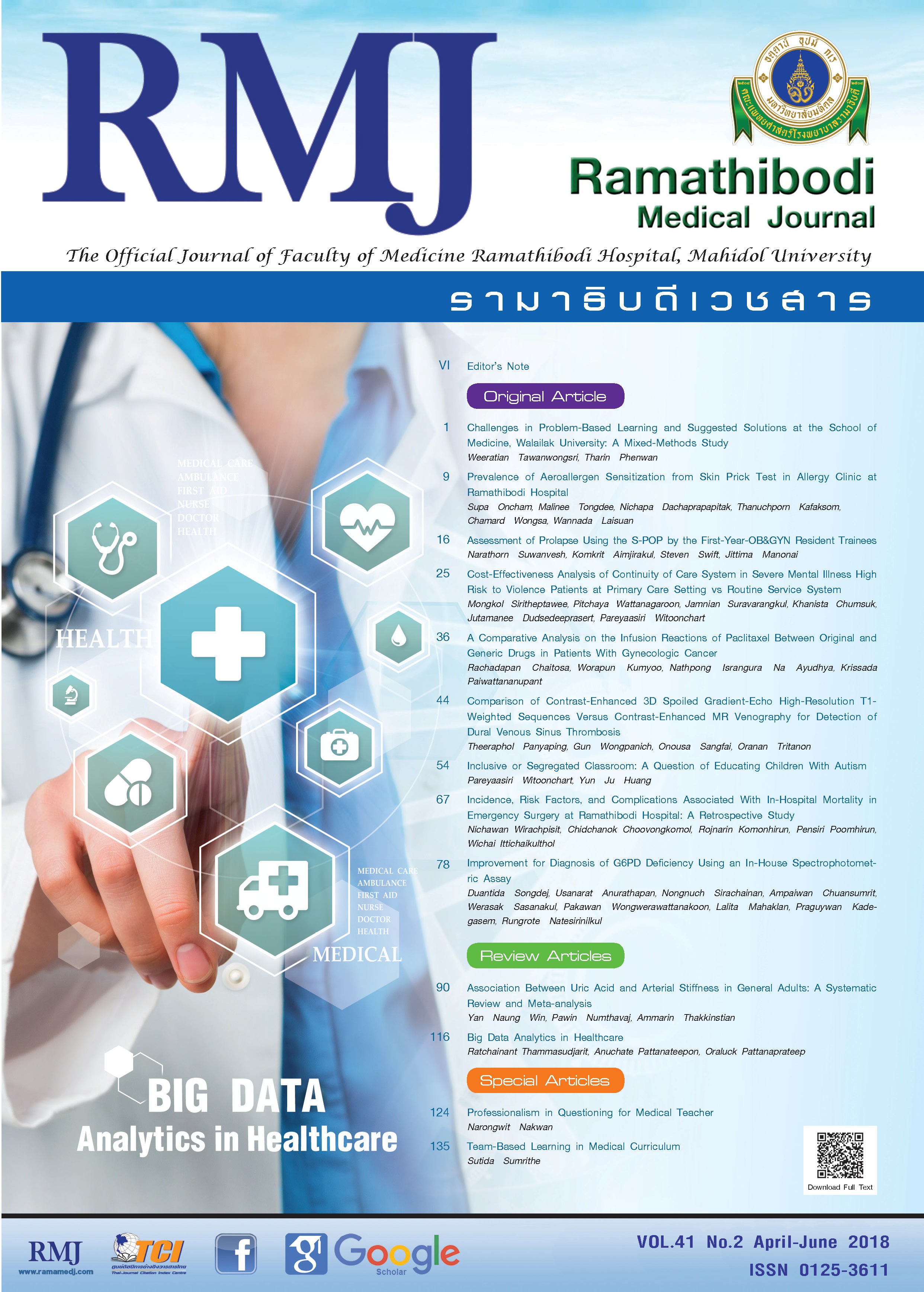Prevalence of Aeroallergen Sensitization from Skin Prick Test in Allergy Clinic at Ramathibodi Hospital
DOI:
https://doi.org/10.14456/rmj.2018.13Keywords:
Aeroallergens, Sensitization, Skin prick test, PrevalenceAbstract
Background: The prevalence of allergic diseases such as allergic rhinitis, asthma, and atopic dermatitis were increased worldwide including Thailand. The aeroallergen sensitization plays a critical role as a major risk factor for developing allergic diseases. There are vary in the prevalence of common aeroallergens sensitization depend on the geography and altitude.
Objective: To demonstrate the prevalence of common aeroallergens sensitization by skin prick test in adult allergy clinic at Ramathibodi Hospital.
Methods: This is a retrospective study collected data from database of adult allergy clinic and medical records of participants who experienced rhinitis and/or chronic urticaria and visited adult allergy clinic at Ramathibodi Hospital during January 2004 to December 2015. All of participants was done skin prick test to aeroallergens.
Results: Of 1,516 patients enrolled with allergic diseases, 1,118 patients (73.7%) were female, . the mean age was 41.34 ± 16.5 years. The patients had allergic rhinitis (58%), asthma (19.7%), atopic dermatitis (3.2%), and chronic urticaria (9.2%). All of patients were done the skin prick test to 17 aeroallergen commercial extracts. The result of skin prick test illustrated that mites (64.8%) was the most common aeroallergen sensitization in adult patients, followed by grass pollen (36%), cockroach (32.3%), house dust (31.5%), cat dander (12.9%), and dog dander (10%), respectively.
Conclusion: Mites is the major aeroallergen sensitization followed by grass pollen, cockroach, house dust, and animal dander.
References
Asher MI, Montefort S, Bjorksten B, Lai CK, Strachan DP, Weiland SK, et al. Worldwide time trends in the prevalence of symptoms of asthma, allergic rhinoconjunctivitis, and eczema in childhood: ISAAC Phases One and Three repeat multicountry cross-sectional surveys. Lancet. 2006;368(9537):733-43.
Bjorksten B, Clayton T, Ellwood P, Stewart A, Strachan D, Group IPIS. Worldwide time trends for symptoms of rhinitis and conjunctivitis: Phase III of the International Study of Asthma and Allergies in Childhood. Pediatr Allergy Immunol. 2008;19(2):110-24.
Bunnag C, Jareoncharsri P, Tantilipikorn P, Vichyanond P, Pawankar R. Epidemiology and current status of allergic rhinitis and asthma in Thailand -- ARIA Asia-Pacific Workshop report. Asian Pac J Allergy Immunol. 2009;27(1):79-86.
Le Souef PN. Variations in genetic influences on the development of asthma throughout childhood, adolescence and early adult life. Curr Opin Allergy Clin Immunol. 2006;6(5):317-22.
Walker S, Khan-Wasti S, Fletcher M, Cullinan P, Harris J, Sheikh A. Seasonal allergic rhinitis is associated with a detrimental effect on examination performance in United Kingdom teenagers: case-control study. J Allergy Clin Immunol. 2007;120(2):381-7.
Arshad SH, Tariq SM, Matthews S, Hakim E. Sensitization to common allergens and its association with allergic disorders at age 4 years: a whole population birth cohort study. Pediatrics. 2001;108(2):E33.
Kihlstrom A, Lilja G, Pershagen G, Hedlin G. Exposure to birch pollen in infancy and development of atopic disease in childhood. J Allergy Clin Immunol. 2002;110(1):78-84.
Ronmark E, Bjerg A, Perzanowski M, Platts-Mills T, Lundback B. Major increase in allergic sensitization in schoolchildren from 1996 to 2006 in northern Sweden. J Allergy Clin Immunol. 2009;124(2):357-63, 63 e1-15.
Lok SD, Davis BE, Cockcroft DW. Prevalence of allergen sensitization in 1000 adults in Saskatchewan. Allergy Asthma Clin Immunol. 2017;13:9.
Sakashita M, Hirota T, Harada M, Nakamichi R, Tsunoda T, Osawa Y, et al. Prevalence of allergic rhinitis and sensitization to common aeroallergens in a Japanese population. Int Arch Allergy Immunol. 2010;151(3):255-61.
Matricardi PM, Kleine-Tebbe J, Hoffmann HJ, Valenta R, Hilger C, Hofmaier S, et al. EAACI Molecular Allergology User's Guide. Pediatr Allergy Immunol. 2016;27 Suppl 23:1-250.















